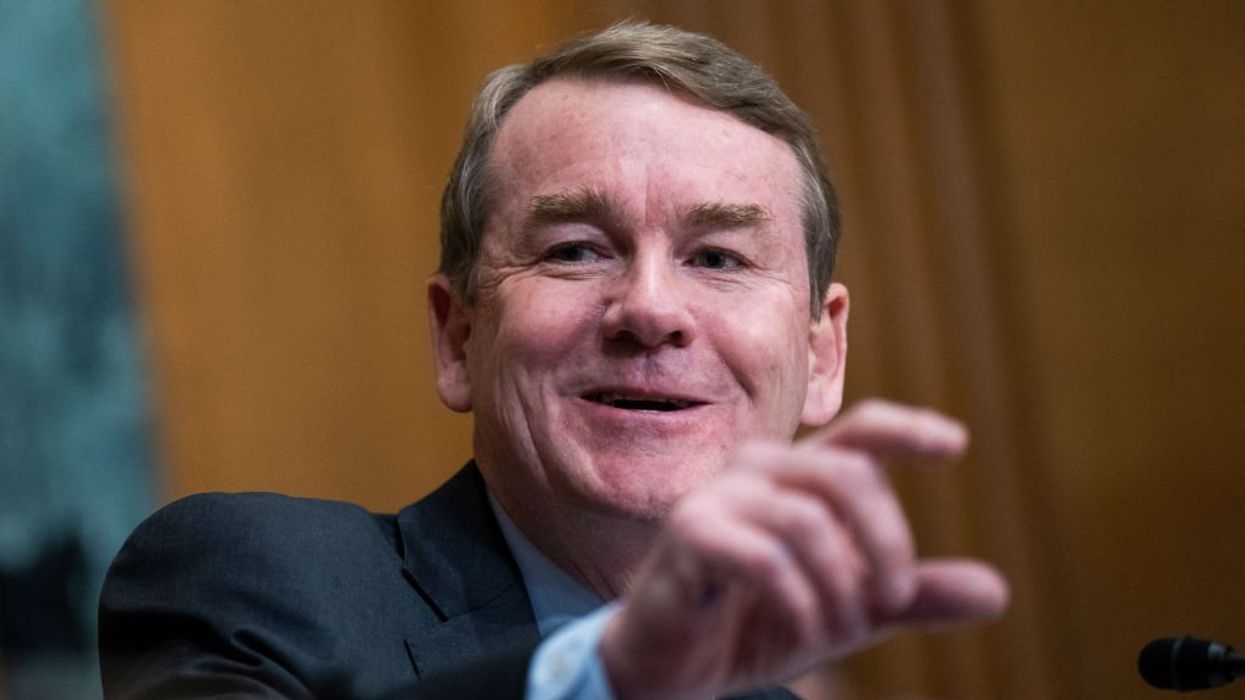
Tom Williams/CQ-Roll Call, Inc via Getty Images

Undeterred by the American people's rejection of the Biden administration's Orwellian disinformation governance board last year, leftist Sens. Michael Bennet (D-Colo.) and Peter Welch (D-Vt.) are seeking to form a new federal agency to regulate speech and behavior online.
The Democratic senators introduced an updated version of Bennet's 2022 "Digital Platform Commission Act" on May 18, which would grow the state, further interfere with Americans' interpersonal engagements online, regulate speech, and altogether police digital platforms.
Nancy Watzman, advisor at the Colorado Media Project, indicated this latest statist venture might serve as a remedy for undesirable speech online, noting "misinformation about the pandemic, public health, elections and more are polluting our online spaces and having real-world negative impacts in our communities."
"Stronger oversight institutions, such as the commission proposed in the Digital Platform Commission Act of 2022, have the potential to strengthen the government’s capacity to promote safe, just, and innovative digital products," said Scott Babwah Brennen, head of online expression policy at the Center on Technology Policy, UNC-Chapel Hill.
"It’s time to establish an independent agency to provide comprehensive oversight of social media companies," added Welch.
Bennet outlined some of the digital problems he reckons tomorrow's unelected technocrats could remedy, including "the collapse of trusted local journalism"; "harms to the mental health of the people of the United States"; "disinformation and hate speech"; and digital platforms "radicalizing individuals to violence."
To address these supposed problems, the bill deems it necessary for the FDPC to be "equipped with the authorities, tools, and expertise to regulate digital platforms to ensure their operations remain consistent, where appropriate, with the public interest."
The FDPC would comprise five commissioners, all appointed by President Joe Biden and approved by the Democrat-dominated U.S. Senate. Each commissar would get a five-year term or hold on to power until the confirmation of a successor.
The hypothetical FDPC would establish a "Code Council," which would in turn develop "proposed voluntary or enforceable behavioral codes, technical standards, or other policies" for social media sites and other digital platforms.
This council of 18 members would include several "disinformation" experts.
It is unclear whether these disinformation councilmen would clamp down on communications undesirable to the state or actual false claims as well — such as Sen. Bennet's suggestion on Twitter in 2019 that Jussie Smollett was the victim of a "despicable attack," which the Colorado Democrat linked to homophobia and racism.
The commission would also wield authority to impose rules on digital platforms that it has designated "systemically important."
For instance, if Biden-appointed commissars aren't pleased with how Elon Musk is running Twitter, they might determine that his platform is "systemically important," designate it as such, then impose upon it whatever rules it can get away with.
After all, Twitter, like Meta and other big platforms, would satisfy all of the mandatory criteria stated in the bill.
The FDPC would ultimately be conferred the power not only to investigate the management of the business of digital platforms but the power to extract from businesses and "from persons directly or indirectly controlling or controlled by, or under direct or indirect control with, those platforms full and complete information necessary, including data flows."
It appears as though the commission would work in unison with other coercive arms of the state when imposing or curing undefined "democratic values" online.
Extra to the host of new taxpayer-funded regulators, the commission "may recruit and train volunteers to help monitor violations of this Act or regulation."
Harmeet K. Dhillon, a lawyer and former Republican National Committeewoman, tweeted, "This is unconstitutional, also evil and stupid," adding, "How stupid do you need to be, in America, to introduce legislation that violates the Constitution?"
Like Blaze News? Bypass the censors, sign up for our newsletters, and get stories like this direct to your inbox. Sign up here!